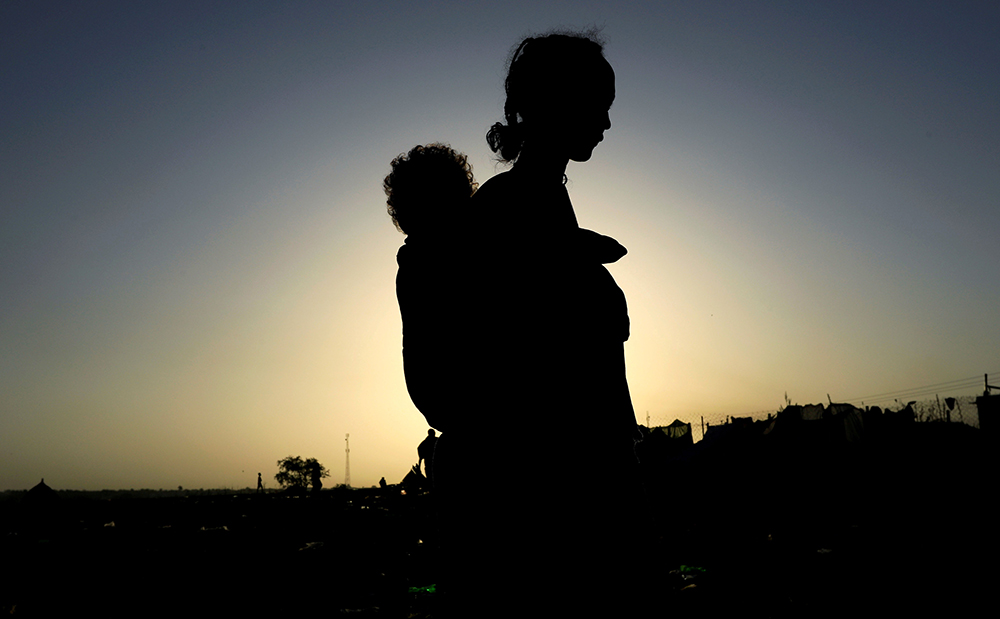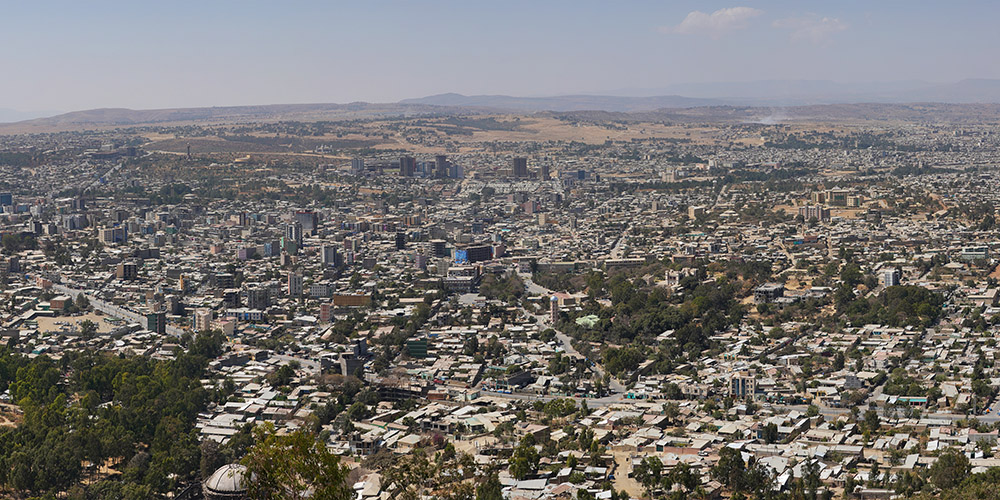
An Ethiopian woman who fled the ongoing fighting in Tigray region, carries her child near the Setit river on the Sudan-Ethiopia border Nov. 22, 2020. (CNS/Reuters/Mohamed Nureldin Abdallah)
Editor's note: Sr. Naomi Nkrumah, a member of the Institute of the Sisters of St. Louis from Ghana, has been keeping us in touch with what has been going on in Ethiopia and Eritrea since the early days of the conflict in the Tigray region. See one of her early columns here.
Roasa Ammuel is a 28-year-old Ethiopian from the Tigray region. She is married with two children, a boy of 8 and another 1-year-old boy. She and her husband lived in Shiraro, in west Tigray; they had a shop where they sold domestic articles. They were not rich but were able to take care of themselves and their family.
Her husband was ex-military, so when the civil war between Tigray and the federal government started in November 2020, he joined the Tigray People's Liberation Front to fight. Roasa Ammuel and her two children were left on their own to take care of the shop and themselves.
Their troubles began when the Eritrean military came to the region to fight against the Tigray defense force in support of Ethiopian Prime Minister Abiy Ahmed. Roasa Ammuel said that the Eritrean military who came to their village met only women and children, and raped, beat or killed most of the women. Roasa Ammuel was one of them who suffered terrible abuse.
It took Roasa a long time to open up to the sisters because of how the people around her were treating her. Now her desire is to see her son, to recover after the war, and to reunite with her husband and the family.
When the military men came to her house, they asked where her husband was; unfortunately for her, her 1-year-old boy told them that his father was a soldier who would fight and beat them. This revelation from the small boy made them angry, and three of the soldiers raped Roasa repeatedly and tortured her so that she could not bear children again.
In her agony, she asked them why they were raping and then killing the women. The soldiers told her that they wanted to eliminate them to the third generation, and did not want them to bear children again.
The soldiers stayed in the village for 10 days and continued to rape the women — even as they bled from their internal injuries — in front of their children.
The Eritrean soldiers committed terrible atrocities. They brought a nursing mother to the village with her baby boy, and in sight of all the women the baby was put in a bag and stomped to death. The other boys in the village were beaten repeatedly.
The military men left the village after 10 days. Many of the women were not able to walk again, but some of the ones who could tried to run away from Shiraro to get medical care. Some who decided to stay in the village died.
Roasa Ammuel was one of the women who ran away from the village, in spite of how difficult it was for her to walk. Fortunately, she and some of the other women were helped by a man who got them transportation to Axum, a larger nearby town. But they were unable to get help at the hospital there because of lack of medical supplies in the region.

A view of Mekelle, in the Tigray region of Ethiopia (Wikimedia Commons/A. Savin)
The eight women were given money for transportation by a good Samaritan, and went to Mekelle, the regional capital, where they got the medical care they needed.
Roasa Ammuel and some of the other women needed surgery. Roasa had three different operations, but she still bleeds and the medical staff don't know how to help her. She is trying to recover with the help of a counselor, but her woes continue to haunt her. She was placed in a refugee camp but was always stigmatized, isolated and rejected by the people there who knew what had happened to her.
Luckily, she was noticed by Sister Ababe, a Daughter of Charity working at the refugee camp. It was really difficult for Roasa to open up to the sister about all that she had been through. Through the help of the Daughters of Charity at Mekelle, she was given a more thorough medical examination; she was found to have heart problems in addition to the fact that she was still bleeding.
Staying at the refugee camp was not helping her, so the sisters rented a room for her to stay in town, because of all that she was going through. They realized that Roasa's ongoing health were due partly to worry about her first son, who is missing. The child ran away with some family members when the Eritrean military invaded their village, fleeing to his grandfather in another village.
Advertisement
As the military continued to go to all the villages, killing and abusing people, the boy followed another group of people — and now he is nowhere to be found. Roasa can't stop thinking and worrying about him, which probably is the cause of her inability to heal and her emotional and psychological turmoil.
The Daughters of Charity are doing all that they can to help her, with the support of generous donor agencies who are helping war victims in the region. I visited Roasa and talked to her. She willingly agreed that I write her story to let the world know what is happening to women and children in this part of the world where war is going on.
It took Roasa a long time to open up to the sisters because of how the people around her were treating her. Now her desire is to see her son, to recover after the war, and to reunite with her husband and the family.
The Daughters of Charity Sisters and other congregations are helping war victims, but funding is very hard to get. Many hospitals are out of drugs and they have no funding for supplies and medicine for the wounded and sick people there.
Doctors Without Borders and other nongovernmental organizations are helping with medical aid in some areas, but the people need food and other essentials, too. The people in Tigray are at the mercy of God.
The war recently intensified, putting the prime minister and the Eritrean military in control. However, on Nov. 2, after peace talks promoted by the African Union, Ethiopia's government and forces in the country's northern Tigray region agreed to a truce that could end the two-year civil war that has killed hundreds of thousands of people and displaced millions.
The Lord hears the cry of the poor, blessed be the Lord our God, is my prayer for the people of the Tigray region.







